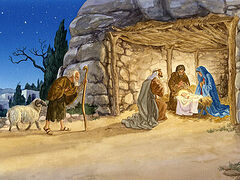Bethlehem, adorn your homes,
For Christmas draws near.
The hymns for the Vigil of St. Nicholas have already been sung:
"Bethlehem, adorn your homes, for the Virgin is coming, bearing Christ.
Magi, bring your glorious gifts; shepherds, sing the Thrice-Holy hymn.
Let everything that has breath praise the Almighty."
Hearing these words, you might ask yourself two questions:
-
Why are we hearing fully Christmas-themed texts so early?
-
What do these calls, directed at the ancient city of Israel, the shepherds, and the Magi, have to do with me?
The answer to the second question is simple. It's because we are not only remembering sacred events; we are called to be participants in them. This is why the words “this day” resound constantly in church hymns.
Today the Virgin draws nigh to Bethlehem.
Today, under the light of the star, the wise men hurry with their gifts.
And today—yes, today—it is my task to prepare within me the adornment of Bethlehem—my heart. This is the answer to the first question.
This is why, long before Christmas, we hear the calls:
“Adorn yourself, prepare, bring your gifts.”
We need time, for we have so much to do!
St. Theophan the Recluse writes:
The Lord will invisibly enter within you. Therefore, enter into yourself and set everything in order there—sweep away every speck of dust from idle and vain thoughts with sighs of repentance, and guard yourself with godly meditation. Wash away with your tears all impurity from sinful feelings and inclinations, and keep yourself in holy vigilance. Correct and restore everything broken and corrupted by falls through sincere repentance, and fortify yourself with holy zeal to fulfill the commandments.
Let more light in through the windows of sincere and unwavering faith, contemplating the mysteries of the divine economy of our salvation. Fill the temple of your heart with the fragrance of prayer and warm devotion to God. Above all, prepare a precious and pleasing dwelling place for Him with unfeigned, complete, and wholehearted love.
Having thus prepared yourself, withdraw even deeper within; wait for the Lord in reverent silence, with longing and fear, with fervent zeal and vigilant attention.
Shepherds, sing the Thrice-Holy hymn
These words might seem easy to dismiss—they don’t apply to me, right? Or do they?
Every time we turn to God in prayer, even the briefest one, we join the choir of heavenly hosts, worshiping the Creator and Lord alongside them. Too lofty a thought? Surely not about us, sinners?
In the life of the great ascetic Anthony, there is mention of a physician from Alexandria who gave his excess to the needy and daily sang the Thrice-Holy Hymn with the angels.
It’s hard to imagine a more demanding profession than that of a physician, especially in ancient Alexandria, where there was just as much noise and bustle as in our modern metropolises. This shows that it’s not the length of one’s prayer that matters, but… What, exactly?
Righteous St. John of Kronstadt answers:
Read even a few prayers, but with understanding and with warmth in your heart. Above all, throughout the day, keep the memory of God—that is, a secret, inner prayer. I myself do not have time to attend long monastic services, but everywhere and always—whether I am walking, riding, sitting, or lying down—the thought of God never leaves me. I pray to Him in spirit, mentally standing before Him and beholding Him before me...
It’s worth trying to remember this call: “Sing the Thrice-Holy with the angels,” especially when beginning morning or evening prayers. It will certainly help increase our focus and attentiveness.
Magi, bring your glorious gifts
And finally, the Magi. As we know, they brought Christ gold, frankincense, and myrrh: gold as a gift to the King, frankincense as a gift to the High Priest and God, and myrrh (a resin used for anointing the dead) as a gift to the Mortal Man.
But what about me? What can I bring to Christ today?
Perhaps it’s time to address a particular fault I need to overcome or work on cultivating a virtue I ought to acquire.
Or maybe I could reflect on the symbolic meaning of the gifts.
For example, what kind of gold can we bring to Christ?
Father Vsevolod Shpiller wrote that the gold within the human heart is the creative, life-giving force that can manifest even in the smallest of things. Cooking a meal, for instance, can be done with love and creativity. And this love, this service to others, is simultaneously service to God, service to Christ—it is the fulfillment of God’s commandments.
The smallest grain of gold sparkles in the rays of the sun. So, too, every good deed done for the benefit of others, every kind word, every smile, becomes part of the gifts we offer to the Divine Infant. “By showing mercy to others, we serve God.”
Frankincense – it is often understood as prayer: focused, heartfelt, living, and attentive.
“Strive always to feel the presence of Christ, the Mother of God, and the saints, and behave as if they are here, beside you. This is how love for God grows and develops.” (St. Paisius of Mount Athos)
Myrrh—a symbol of love that death cannot conquer, a love stronger than death itself. This is the kind of love that we can bring to Christ:
"Die to your sins in order to gain the ability to live—to live with all the breadth, depth, and intensity to which we are called." (Metropolitan Anthony of Sourozh)
In truth, we are rich in opportunities. The Lord, who promised not to forget even a cup of water given in His name, will accept our gifts, no matter how small they may be. The key is not to let our hands fall, not to become lazy, not to sit idly by, but to keep going, not resting until we reach Bethlehem!
***
The hymn sung on the feast of St. Nicholas reminds us that at the Christmas service, each of us will receive what we have prepared for.
“At the Christmas service, each of us will receive what we have prepared. We eat the dish that we have cooked. We sleep in the bed we have made. We reap what we have sown. By God's great love, a person is given exactly what he is ready for. The Lord always grants us what we desire. What we expect, we reap. Each one receives according to the readiness of his heart. One receives God, another receives the church hymns, a third receives the meaning of certain sacred texts, and a fourth—the Kingdom of Heaven," writes Archimandrite Aimilianos (Vafidis).
Prepare O Bethlehem, the Lord is already drawing nigh!




